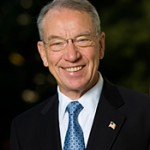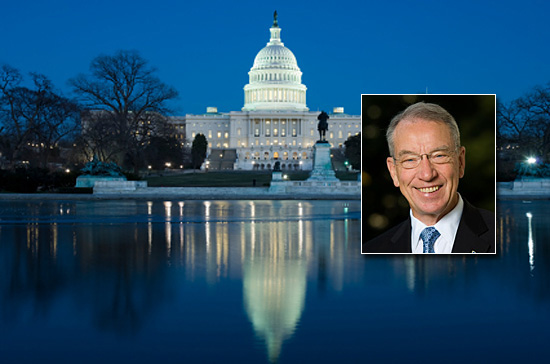Q&A on FISA from Senator Charles Grassley:

Q: What is FISA?
A: The Foreign Intelligence Surveillance Act of 1978 is more commonly known by its acronym FISA. The law sets the parameters by which America’s intelligence community may conduct physical and electronic surveillance of those suspected of espionage or terrorism. Until the 9/11 terrorist attacks, many Americans likely were largely unaware of surveillance powers authorized by this federal law that was designed to protect U.S. national security and economic interests. More recently, FISA has made headlines due to controversial activities conducted by the National Security Agency (NSA) over the last decade. Since 9/11 the NSA has cast a wide surveillance net that calls into question privacy protections and Fourth Amendment rights related to search and seizure, including a program through which it collects information about the telephone calls of Americans but not the content of the calls themselves.
Q: What is at stake?
A: An abundance of skepticism exists today among Americans about the size and scope of the federal government. The $17 trillion national debt represents unbridled tax and spending policies that allow the government to grow at the expense of the taxpaying public. The bungled rollout of the Affordable Care Act is arguably circus peanuts compared to the intrusive impact that the sweeping health care law’s mandates, penalties and taxes will have on job creation, economic growth and the taxpaying public. Likewise, the revelations leaked by former NSA contractor Edward Snowden this summer have triggered considerable public debate and civil lawsuits that challenge the government’s authority to deploy sweeping surveillance measures at the expense of individual privacy. Our system of self-government counts upon the fundamental functions of checks and balances to make the government work of, by and for the people. The government’s fundamental mission to protect public safety, secure the homeland and uphold national security does not come with a license to ignore constitutional boundaries, legal precedents and rule of law that governs our nation. Americans expect their government to leave no stone unturned to protect national security interests. The citizenry also expects its government to protect the freedoms and civil liberty set in stone by the U.S. Constitution. Americans from across the political spectrum are unsettled about the NSA’s activities. Technology is transforming the way the federal government is able to conduct surveillance and intelligence activities. Similarly, debates about privacy are building in local communities around the country as law enforcement authorities use surveillance cameras to issue citations for traffic violations. Both raise complicated issues involving public safety and personal privacy. Just because 21st century capabilities exist to collect mass surveillance does not mean government gets unchecked authority to ignore the founding principles established centuries ago to protect “we the people” from government intrusion.
Q: What are next steps in the unfolding debate on U.S. surveillance policy?
A: From my leadership position on the U.S. Senate Judiciary Committee, I’m scrutinizing the scope of the federal government’s surveillance activities through congressional oversight hearings and analyzing bipartisan proposals to address flaws in the system. Legislative reforms may be needed to rein in surveillance overreach, foster transparency and enforce accountability among the U.S. intelligence community, including possible disclosure reforms of the Foreign Intelligence Surveillance Court (FISC). The architecture of our republic’s system of checks and balances authorizes the three branches of the federal government to keep an eye on each other to prevent authoritarianism from intruding on individual rights. Congress is obligated to ensure the U.S. intelligence apparatus does not overstep constitutionally protected rights of individuals while fulfilling its core mission to protect national security. After 9/11, policymakers zeroed in on the failure of the federal government to “connect the dots” and thwart terrorism on U.S. soil. Moving forward, policymakers can help rebuild the public’s trust in the government’s ability to “connect the dots” and strike a better balance between intelligence-gathering activities and individual rights.








But he has no problem busting your door down for the smell of pot! Give me a break!